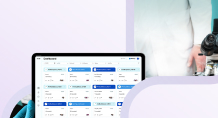Rostislav Kirchev (a.k.a. Rosti) is a Senior Front-end developer with over 10 years of experience developing various types of software. His career took many steps, including quitting and then returning to BGO Software. Through his journey, he learned many lessons – from how to self-motivate to the importance of having the right people to surround you during your development.
Who is Rosti at BGO Software?
“I don’t know that guy!” (laughs) Seriously now, I’m just a guy doing his job. I’ve been deeply involved in one of the most extensive projects for a pharmaceutical manufacturing company for the past seven years, and I couldn’t be happier. At heart, I’m a front-end developer, a musician, an adventurer, and a cook in my precious free time.
You’re one of the people who chose to return to BGO after quitting. What influenced your decision?
I was gone for eight months. My decision to quit at that time resulted from a feeling that I was not contributing enough to the project and the company. During that period, I stayed in touch with the CTO, Ivailo Ivanov. But my new job didn’t feel quite right either. So, I set up a few interviews elsewhere for a reality check. I explored potential teams, assessed the people I’d be working with, and soon realized it was all wrong. I had a newfound appreciation for BGO Software – its workplace, atmosphere, and team. I simply picked up the phone, called Ivailo, and asked, ‘Should I come home?’ (laughs)
The project you are working on is for a pharmaceutical manufacturing company. One of the biggest worldwide. How the specifics of the project are influencing your expertise as a developer, what are the challenges that you are facing?
What we’re engaged in is similar to the procedures we would follow for any standard software application. This includes tasks such as designing graphics, creating forms for data entry, and so on. However, there are two significant distinctions when developing software for a pharmaceutical organization. Firstly, there’s a stringent requirement for validation and GxP approval to ensure it meets the necessary standards for use by end-users. The key benefit of validated systems lies in enhancing security and ensuring the safety of the entire process workflow.
Conversely, every validated system must include an Audit Trail, which serves to record all activities within the system. This log provides information on who performed an action, when it occurred, where it took place, and the specific nature of the activity. Such a feature is essential for regulatory authorities during audits and inspections.
The primary challenge lies in managing these types of systems, especially within the context of this project, where the focus is on the validation process. We’ve succeeded in developing a complex front-end architecture that allows us to validate one part of the system while simultaneously continuing work on other components of the project.
What is important for a front-end developer to have as a skill?
One of the most important things for a front-end developer, and I believe that applies for all professionals no matter the field of expertise, is to be curious how to do their job better and better. That allows them to continuously improve and learn. You stop growing the minute you stop being curious. This is also one of BGO`s values that I recognize for myself – Always improve.
From the perspective of your experience, what advice would you give me if I were a Junior Developer?
The most important thing for a Junior is to find something that resonates with their passions. The best way to do that is to start your project outside of work and university. It’s common to be given easier tasks at work while you’re learning, but the real experience comes when you find your way to accomplish a task.
Another good piece of advice, based on my experience, is to find a mentor who will guide you on your learning journey. Over the years, I’ve had a few mentors who have positively influenced my professional development. The mentor needs to find the best way to approach you, to understand how you perceive information, and what your learning style is.
What are the lessons you’ve learned so far?
The most important aspect is for a person to have processes, whether we’re talking about the team, the project, or personal aspects. The lack of process is noticeable, and people often struggle to find a way to achieve a task. I notice the tendency of soft skills to be underestimated. But they are so crucial for every professional. You can always learn technical skills, but knowing how to work in a team, communicate appropriately your issues, or navigate a conflict is up to soft skills and emotional intelligence.
You said that in your free time, you like cooking and adventures. Tell me about your passions.
Currently, I have four different types of hobbies – music, because I like to sing, cooking, snowboarding – the freedom of being alone in the mountains is invaluable, and BikePacking – probably the best way to travel and experience different countries and cultures. The lack of a hobby or something that you like to do in your free time for me is a bad sign. One should know how to relax and recharge, otherwise, they will burn out. Maintaining a hobby is a good way to keep your physical and psychological health in place.
What advice would you give yourself 10 years ago?
Keep going; you are on the right road.








